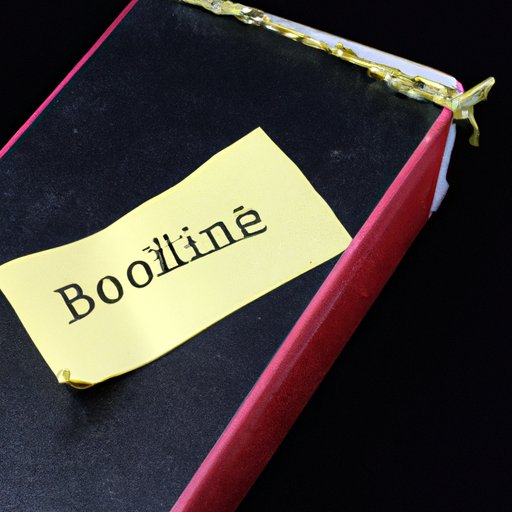Introduction
Books are often considered to be a beacon of knowledge and freedom, but there are times when certain books are banned from circulating. Book banning is a highly controversial issue that has been the subject of debate for decades. It’s important to understand why books are banned and the implications that it has on society.
This article aims to provide an in-depth analysis by exploring the reasons behind book banning and the impact it has on people and society as a whole. We’ll trace the history of book banning, discuss some of the most common reasons cited for book banning, and examine both the legal and ethical implications of banning books. Lastly, we’ll discuss how book banning can backfire and provide some suggestions for how readers can advocate for the freedom to read and combat book banning.
Uncovering the Censorship Debate: Exploring the Reasons Behind Book Banning
Book banning and censorship can be defined as the suppression of ideas, information, or artistic expression by a government, organization or individual. Some argue that censorship is necessary to protect society from dangerous ideas, while others believe that it stifles creativity, freedom of thought, and intellectual progress.
One of the most common justifications for book banning is the desire to protect children from material that may be considered obscene or offensive. Books with sexual content, violence, or profanity are frequently banned from schools and public libraries. Others argue that books that promote hate speech or discriminatory attitudes towards certain groups must also be banned.
The Power of Words: Understanding the Motivations for Banning Books
Books have the power to provoke emotions, influence ideas and shape perspectives. This is precisely what makes them so appealing and potentially dangerous in the eyes of some. Literature can contain controversial themes and ideas that are not considered acceptable in society or go against historically established norms. This has led to books being banned for being threatening, subversive, or even revolutionary.
Some of the most banned books of all time, like Harper Lee’s ‘To Kill a Mockingbird’ or George Orwell’s ‘1984’, deal with issues of power, identity, and freedom. Some books have been banned for their explorations of sexuality or LGBTQ+ themes, like Alan Hollinghurst’s ‘The Swimming-Pool Library’ or Annie Proulx’s ‘Brokeback Mountain’. Other books have been banned for exploring taboo subjects like drug use or suicide, like J.D. Salinger’s ‘The Catcher in the Rye’.
The Dangerous Power of Free Thought: An Analysis of Book Banning Through the Ages
The concept of book banning has been in existence for centuries. From the times of the Ancient Greeks, where Plato called for the expulsion of poets from his utopia, to the Spanish Inquisition and the Nazi regime, which burned books, history is littered with examples of people using literature as a tool for control and manipulation.
Book banning has also been used as a way to suppress revolutionary ideas. Works by Marx, Lenin, and even the Bible were banned in the Soviet Union during the Cold War era. Books by African American writers like James Baldwin, Maya Angelou, and Alice Walker were banned during the apartheid era in South Africa. In the United States, books by Mark Twain, John Steinbeck, and Maya Angelou have been banned for their controversial themes and language.
The Right to Read: Examining the Legal and Moral Implications of Banning Books
Book banning is not just a moral issue but a legal one as well. In the United States, the First Amendment of the Constitution guarantees freedom of expression, which includes the right to read. However, this right is not absolute and must be balanced against other legal interests, such as the protection of minors or national security.
There have been several landmark court cases related to book banning, including the 1982 case Island Trees School District v. Pico, in which the Supreme Court ruled that school boards could not remove books from library shelves simply because of their objections to the content. However, the ruling did allow restrictions on access to books deemed inappropriate or harmful.
Knowledge is Power: The Paradox of Book Banning and Its Impact on Society
The irony of book banning is that it often ends up causing more harm than good. In many cases, banned books have become more popular precisely because they have been banned. Banning a book can often have the opposite effect, generating more curiosity and interest within readers that may not have been exposed to the book otherwise.
Furthermore, book banning can have long-term consequences. By restricting access to certain types of literature, societies may inadvertently limit the range of thoughts and ideas that people are exposed to, resulting in a less informed and less open society overall. This can affect everyone in society, from children to intellectuals.
Conclusion
Book banning is a highly controversial issue that has been the subject of debate for centuries. Understanding why books are banned and the consequences of banning them is critical to promoting freedom of thought, expression, and creativity. The power of literature to influence and shape perspectives cannot be underestimated, and the right to read is a fundamental human right that must be protected.
In conclusion, we must continue to engage in the debate about censorship and freedom of expression to ensure that our right to read is not impinged upon. Only through ongoing dialogue and advocacy can we hope to create a world where ideas and expression are not suppressed by those who fear them.
